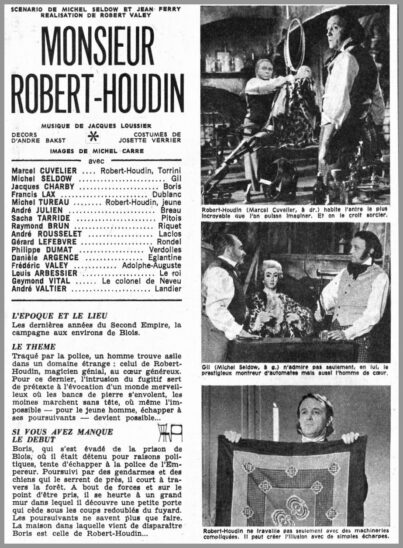Those wanting a straight biographical portrait of the legendary French magician Jean-Eugène Robert Houdin (1805-1871) should probably avoid this 1966 telefilm. Its treatment is far from orthodox, but taken purely as an immersion in the fantastique, MONSIEUR ROBERT HOUDIN, broadcast in November 1966 and again in February 1971 (prior to a digital restoration in 2016), is rather remarkable.
1869: Boris (Jacques Charby), a political dissident, has escaped from prison and is being pursued by authorities. He happens upon a vast wall bordering the Priory, a.k.a. the country estate of Robert Houdin, as indicated by a door in the wall bearing his name, and a sign reading “Entrez” (Enter). Boris enters and the door closes behind him, and when his pursuers reach it the sign changes to read “Passez votre chemin” (Go your way).
Within the Priory is an irrational universe in which automatons congregate and a levitating stone bench deposits Boris at the doorstep of Houdin’s mansion. Inside he’s greeted by a man’s disembodied head in a dish, and the sudden appearance of Houdin (Marcel Cuvelier) in a spinning chair. Boris is anxious to leave but the aging Houdin, Ancient Mariner-like, insists on relating the story of his life.
Houdin’s soliloquy, dramatized via flashbacks, begins with his youthful self (Michel Tureau) and his apprenticeship to Torini (Cuvelier, again), a travelling magician. Houdin also discusses his marriage to Josèphe Cecile Houdin (Danièle Argence), from whom he took his last name, as well as his self-created Théâtre des Soirées Fantastiques and his most famous magic trick, involving the apparent levitation of his young son (which as with all the magic depicted in this film is presented as a factual occurrence rather than a trick). Also covered are Houdin’s government-sponsored trip to French Algeria, where he used his talents to quell a political uprising, and his involvement in the Mechanical Turk hoax.
This was the first film made about Robert Houdin (not counting Georges Méliès’ 1896 short RETRACTION OF A LADY AT THE HOUSE OF ROBERT HOUDIN/Escamotage d’une dame au théâtre Robert-Houdin below) and extremely ambitious for its time. Michel Seldow, a co-writer (together with frequent Harry Kumel collaborator Jean Ferry) and bit player (as the talking head in the dish), was a renowned Houdin scholar, which makes this film’s view of the man, as a combination Wizard of Oz and Merlin the Magician, i.e. a skilled sleight-of-hand artist and supernaturally endowed being, all the more puzzling. The intent may have been to approximate the highly fanciful account provided by Houdin in his 1859 memoir, but I’d argue the suggestion that he was magically endowed reduces his world-renowned talent for trickery.
RETRACTION OF A LADY AT THE HOUSE OF ROBERT HOUDIN (1896) Short
I’ll also complain about the overly scant runtime. Eighty minutes may have been standard for a 1960s French TVM, but isn’t nearly long enough to encompass Robert Houdin’s life, especially with such an unorthodox treatment.
Yet those issues aside, this is an impressive work. The direction by French TV specialist Robert Valey and black-and-white cinematography by Michel Carré demonstrate enormous competency and professionalism—meaning that, unlike the vast majority of 1960s French TVMs, MONSIEUR ROBERT HOUDIN looks and feels like an actual movie.
Throughout, it’s the never-resolved tension between reality and illusion that takes center stage thematically. In that category this film, despite painfully dated special effects, outdoes the similarly themed 2006 productions THE ILLUSIONIST and THE PRESTIGE while harboring one invaluable asset: Marcel Cuvelier, who plays both the title role and his mentor Torini, and excels as both.
Vital Statistics
MONSIEUR ROBERT HOUDIN
ORTF
Director: Robert Valey
Screenplay: Jean Ferry, Michel Seldow
Cinematography: Michel Carré
Cast: Marcel Cuvelier, Jacques Charby, Michel Seldow, Michel Tureau, Francis Lax, Philippe Dumas, André Valtier, Mohamed Boudia, André Julien, Danièle Argence, Alfred Baillou, Louis Arbessier, Alexandre Grecq, Geymond Vital, Frédéric Valey, Jeanne Sartre, Sacha Tarride, Raymond Brun

